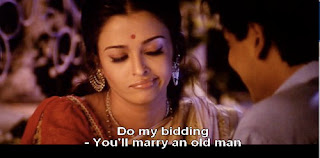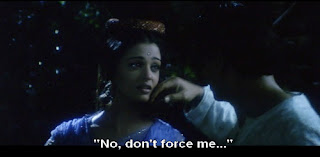In defense of Devdas, the movie everyone loves to hate
What follows is an expanded version of a comment originally posted on Bollyviewer's review of Bimal Roy's Devdas (1955):
Since everybody hates the Sanjay Leela Bhansali version of Devdas (2002), I feel I have to say a few words in its defense. After all, I did pick it as one of my favorite Bollywood films of the 2000s.
Say what you will about Shah Rukh Khan in the thankless title role—and most people say he's over the top. But I'm not sure any approach would make this character fully sympathetic. After all, Devdas is callous, weak, abusive, self-pitying, and self-destructive. Given those elements of the character, going operatic makes as much sense as any other approach (someone underplaying the role would have gotten lost in SLB's outrageously lush visuals).
But what makes the 2002 version so special for me is Ismail Darbar's music, and the way that the songs are so carefully woven into the narrative. In fact, the songs convey absolutely crucial information, particularly in the sequence "Bairi Piya," "Morey Piya," and "Kaahe Chhed Mohe."
Taking the first four songs in order:
1. "Silsila Yeh Chaahat Ka" expresses the yearning of Devdas' childhood sweetheart Paro (Aishwarya Rai) for Devdas' return:
It's significant that the first number is a performance of Paro's unwavering devotion—a devotion that will be severely tested over the course of following events.
2. "Bairi Piya": Devdas and Paro tease and flirt with each other, though there's an edge that suggests Devdas' later violence against Paro. Two important things happen during this song. First is the symbolic marriage of Devdas and Paro, when Devdas gives her his grandmother's wedding bangle. And second, each makes a prediction about the other's future. His prediction for her:
Hers for him:
Both predictions, of course, will come true.
3. "More Piya" involves two intercut sequences. Paro's mother Sumitra (Kirron Kher) celebrates what she thinks will be Paro and Devdas' engagement with a love song about the encounter of Radha and Krishna on the banks of the Yamuna.
Meanwhile, on the banks of their local stream, Devdas is raping Paro. While "rape" perhaps doesn't quite capture all the nuances of what's happening between them, there really is no other word for it. Paro loves him, doesn't struggle, and ultimately acquiesces, but there's no mistaking her reluctance:
The invocations of Krishna and Radha in Sumitra's song and the prominence of the flute (Krishna's instrument) in the Devdas-Paro sequences, plus the the explicit symbolism (the river bank, the water jugs, and the way Devdas removes Paro's jewelry and veil as a husband removes his bride's on their wedding night) leave no doubt about what takes place between Devdas and Paro. And this makes Devdas' later repudiation of Paro even more heartless and cruel.
4. "Kaahe Chhed Mohe": The very next song, performed by the tawaif Chandramukhi (Madhuri Dixit) for Devdas, his dissolute friend Chunnilal (Jackie Shroff) and a third man whose importance is only revealed later, is another retelling of the Krishna and Radha story. As Chandramukhi sings of Krishna,
Devdas realizes his own cruelty and callousness towards Paro, and the terrible mistake he's made in sending her a letter of rejection. Alas, his remorse comes too late.
Incidentally, thanks to
Devdas was the second Bollywood film we saw, and we were mesmerized by it. I realize that we're in a distinct minority, and know it's a film that people love to hate. But it's so obviously a labor of love for everyone involved that I just can't share that disdain. And SLB's hallucinatorily rich visuals are a sumptuous feast. The moment in "Kaahe Chhed Mohe" when Chandramukhi spins outside, and we see the whole pleasure district behind her lit up in the night and filled with tiny moving and dancing figures, is simply breathtaking.
Bimal Roy is, of course, one of the greatest directors of not only Indian but world cinema. I think, though, that a small-scale and realistic approach to these characters just foregrounds how despicable Devdas' actions are. Instead, I feel that the story of Devdas requires a heightened quality and larger-than-life emotions, something that the SLB version certainly provides.
As I wrote in my comment on Bollyviewer's post, give me a moment to get under cover, and then you can start throwing things!
Update 28 May 2012: It seems that it's not just me who appreciates Devdas. It came in at a surprising Number 1 in the Top 10 Shah Rukh Khan Movies as voted by the viewers of Namaste America. And it was listed at Number 8 on Time magazine critic Richard Corliss' 10 Greatest Films of the Millennium (Thus Far), although any list that also includes Moulin Rouge (2001) and Avatar (2009) has to be viewed with some skepticism.
Here's a glimpse of why Devdas is so ravishing: the exquisite Madhuri Dixit in "Kaahe Chhed Mohe":


















I, for one, love to love Devdas. It's still one of the most visually stunning pieces of cinema I've seen. And I love your post!You've put into words the subtle little things, that always make me want to rewatch Devdas.
ReplyDeleteThanks for your kind words, Anishok! Bhansali's aesthetic is often accused of being excessive. But like you, I think Devdas is gorgeous, and filled with subtleties. In "Kahe Chhed Mohe," for example, there are echoes of specific moments from Mughal-e-Azam, Pakeezah, Umrao Jaan, Chauvin Ka Chand and Sahib Bibi Aur Ghulam--Bhansali's homage to the great courtesan dances of Bollywood's past. Of course, we saw Devdas for the first time very early in our exploration of Bollywood, and only became aware of those echoes later on. But that's another reason we keep returning to Devdas: it gets richer with each viewing.
ReplyDeleteBest,
P.
This comment has been removed by the author.
ReplyDeleteThanks for your comment, TBF! As you note, with SLB the visuals definitely come first. I haven't seen Khamoshi (though I've heard it praised) but I did see Saawariya, and I agree that in the latter the script is sadly lacking (and the performances by Ranbir Kapoor, Sonam Kapoor and Salman Khan don't help matters).
ReplyDeleteI feel somewhat differently about Devdas, though. While the story is problematic, that seems to be the fault of Chattopadhyay's original novel. And while the dialogue isn't naturalistic, it has the same emotionally heightened quality as the visuals. Love it or hate it, that operatic quality is a big part of SLB's aesthetic in Devdas, and I felt worked.
I will confess, though, that I rarely re-watch the entire film. Instead, far more frequently I find myself playing the song sequences. They're so well integrated into the narrative that they basically tell the story by themselves, and as you say, they're ravishing on many levels.
Devdas was indeed the debut of Shreya Ghoshal, who was the playback singer for Aishwarya Rai and won several national awards for her work. Kavita Krishnamurthy was the playback singer for Maduri in "Kahe Chhed Mohe," "Maar Daala," "Dola Re," and "Chalak Chalak" and was equally splendid (and shared some of those awards with Shreya).
There have been a number of versions of film-Devdas. Even one of the versions was made in Pakistan. I have written an article entitled- 'Three versions of film- Devdas'. This research paper has been accepted and placed of the following site:
ReplyDeletehttp://www.apnaorg.com/research-aperssatish-11/
I will therefore look forward dispassionate views of the viewers.
satishchopra@rediffmail.com
The reason the new Devdas was such a bad film was the lack of emotional connection between Ash and SRK. The film did not move me in the slightest. I did not care about the two main protaganists. In fact I looked around at bewilderment at other cinema-goers crying in the cinema hall.There was something lacking. The director placed too much emphasis on visuals. Compare this version with the older Dilip version which was sublime.The only postive aspect of new version was Madhuri who showed a little depth in her acting.
ReplyDeleteAnonymous, I'm not sure I agree about the lack of chemistry between Aish and SRK. Devdas and Paro have a very complicated relationship: he abuses her sexually, emotionally and physically over the course of the film, and so wariness and distance on her part is absolutely called for. Perhaps for you that becomes a fatal lack of chemistry.
ReplyDeleteBut I definitely can't agree with you when you call it a bad film. No film that has Madhuri's affecting portrayal of Chandramukhi, the expressive and beautifully eloquent dancing of Madhuri and Aishwarya (separately and together), the gorgeous soundtrack of Ismail Darbar, and the sumptuous visuals of SLB can be bad. Flawed, problematic, difficult, contradictory, yes; disappointing, perhaps. Bad? I'll apply that term to generic commercial product, but not to such a deeply felt and obsessively realized personal vision such as Devdas.
lack of chemistry?Bairi Piya song shows the chemistry between them..i don't think Paro was a victim in that relationship(the way she throws those cards back at him in that song and her resolute attitude towards Devdas when he comes back after realizing his mistake just before her marriage s)yes,she was in love with him but she was not helpless,she could speak her mind in front of him.Devdas was weak where as paro was embodiment of love ,strength and integrity.But i do not think Devdas had violated her physically.yes,there was possessiveness which was bordering on negative side but that is part of their nature of the relationship.basically the whole argument about the nature of the relationship is itself captured in the scene before marriage.
Deletei like the scene when Paro comes to meet Devdas to persuade him to quit drinking.the way both reminisce to realize that they still are attached to each other.his taunting regarding Paro's marriage,asking Paro to search for a girl like her.. all pretense culminates in his blatant admission of his longing where he asks her to run away with him in the pretext of argument.
Pardon me, but Kaahe Chhed Chhed Mohe's music was given by Pandit Birju Maharaj, who also sang the starting bits in the song, along with Madhuri Dixit's recitation of his lyrical poetry.
ReplyDeleteAnonymous, you are absolutely correct. My apologies for mis-crediting the music and lyrics of "Kaahe Chhed Mohe." Ismail Darbar is credited with composing the music for the other songs discussed in this post.
ReplyDeleteThanks for the points you drew out of the movie. You cleared up a few areas that I didn't really understand. I have loved this movie for many years and still can't stop watching it. Bad? Certainly not to me. :-D
ReplyDelete